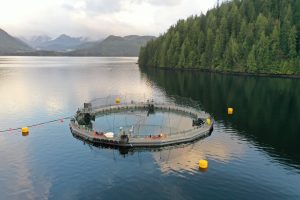
March 16 2022, student Xiaoxue Zhang defended her PhD thesis titled “The development of antifouling materials with potential application on sensors”. Zhang has been doing her PhD at the Norwegian University of Science and Technology (NTNU) in the SENSOR project of CtrlAQUA. NTNU-professor Øyvind Mikkelsen was her supervisor. About the subject Unwanted biofilm is one…

UV light can kill 99.9 percent of bacteria and viruses found in the inlet water of aquaculture facilities. But how large should the doses be? Recent Nofima research in the CtrlAQUA Intake project “Strategies for water treatment in closed-containment aquaculture” shows that there is a lot of gain from adapting the dose to the pathogen…

Written by: Reidun Lilleholt Kraugerud for the CtrlAQUA Annual Report 2020 With the pace of new land based salmon facilities being build, one can get the impression that there are few challenges remaining with RAS technology. However, the increasing number and size of plants are incentives for solving sustainability challenges for the technology provider Krüger Kaldnes.…

The CtrlAQUA annual report for 2020 is now released, presenting an update on the latest development in research and innovation within closed containment aquaculture. “What stands out in 2020, is that CtrlAQUA is in continuous progress with solid work with innovations. However, there are still some bottlenecks left before we can say that the systems…

Written by: Reidun Lilleholt Kraugerud for the CtrlAQUA Annual Report 2020 Cermaq has now started the third round of salmon production in closed containment systems, without having to delouse. In the neighbouring net pen, which has a traditional net system, they have had to delouse several times. It is precisely the combination of a semi-closed containment…
About the position Are you interested in research areas at the intersection of fish biology and aquaculture technology and with the development of closed containment aquaculture systems, namely recirculating aquaculture systems (RAS)? We are looking for a researcher with both theoretical and practical experience within topics such as water quality, water treatment and the biology…

Written for Nofima by Jon-Are Berg-Jacobsen New research shows that land-based recirculation facilities for salmon farming in Norway and in North America are disinfected in different ways. An overall picture of current practice may provide knowledge that increases safety in a rapidly growing industry. Nofima scientist Carlo C. Lazado and Chris Good of The Conservation…

By: Per Haakon Stenhaug at Krüger Kaldnes: telephone +47 415 77 368 The Process Engineer Sharada Navada (30) does not eat fish but has recently completed a PhD in “salinity acclimation strategies for nitrifying bioreactors in recirculation aquaculture systemes”. Her sensational results have already been applied by the aquaculture industry. Normally, the 30-year-old works at the…

Audience from all over the world are virtually welcome to the aquaculture town of Sunndalsøra and the webinar «Smolt production in the future» 21 October. “This year we are hosting a webinar due to the covid-19 situation instead of our traditional conference. But we hope you are able to join us!”, says webinar’s scientific coordinator…

Nofima scientists studied the effect of LED light on salmon performance in closed-containment recirculated aquaculture systems. So far, the existing lighting conditions for salmon in recirculating aquaculture systems (RAS) appear to be safe in terms of growth and mortality rates. “However, we still know little about how the light affects salmon physiology and how they…









